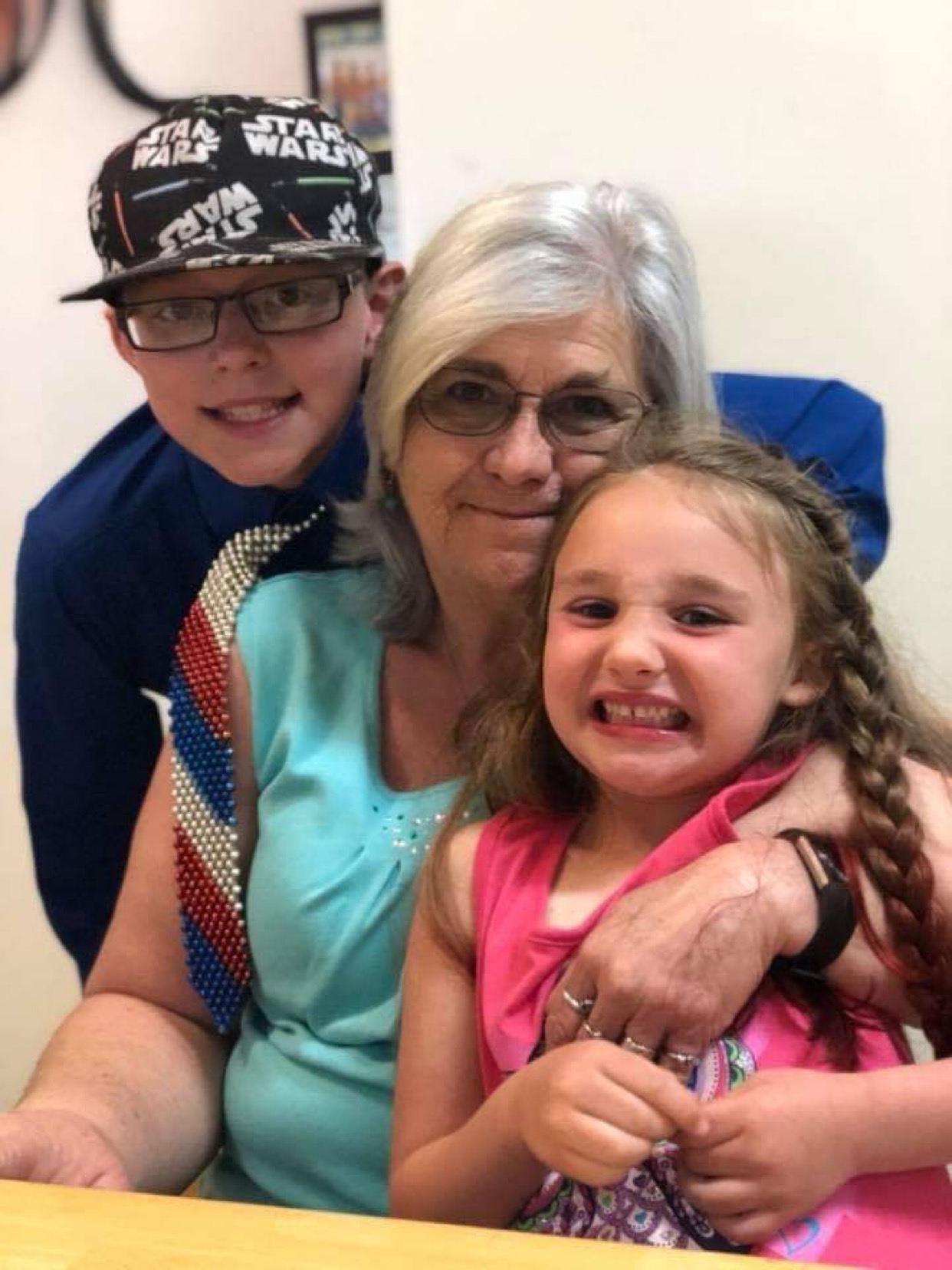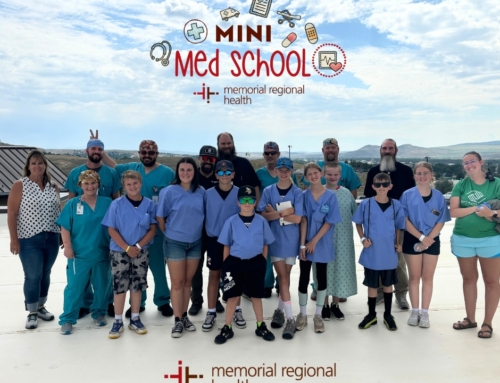“It can happen to anybody”: Patient with no family history of breast cancer gets tumor surgically removed
Routine mammograms and self-examinations at home can help with early detection, treatment
Charlotte Woods was receiving a CT scan for her chronic obstructive pulmonary disease (COPD) when her pulmonologist noticed an abnormal growth in her chest area.
While her lungs were in good shape, he advised her to talk to her doctor about having the abnormality checked out. Per doctor’s orders, Woods had a mammogram performed, followed by a biopsy, and an early formation of a small tumor in her breast was discovered. Within one week of her visit with her pulmonologist, she was diagnosed with breast cancer in September 2019, despite having no known history of the cancer in her family.
“I never thought I’d be thanking my pulmonologist for saving me from breast cancer,” she said. “I was shocked. Admittedly, I hadn’t worried about getting regular mammograms done or performing self-examinations because I didn’t think I was at risk. After I spent some time processing my disease, I knew what I needed to do. I wanted it out of my body.”
Woods was diagnosed with breast cancer at Memorial Regional Health and also received her treatment at the hospital. She opted for surgery to remove the tumor, since it was found in its very early stages. Dr. Jeff Womble performed the surgery in October 2019.
“It all happened so fast,” she said. “I leaned on my faith and talked to others who were diagnosed and undergoing radiation, and that really helped me. It was nice to know that other people were going through this and that I wasn’t alone.”
Woods has been disease-free for more than a year now, and she feels hopeful it will stay that way for years to come. Though she now resides in Montrose, where she continues her radiation and hormonal therapy, she noted how happy she was with the care she received while in Craig.
“Everyone at MRH was wonderful and kept me well informed,” she said. “I never felt pity, but rather, they gave me sympathy. It was really nice and refreshing. You want that compassion and they had that. I really appreciated it, especially as I came to terms with the fact that I had cancer.”
October is Breast Cancer Awareness Month, which is a time meant for raising awareness about breast cancer and the importance of self-exams and routine mammograms, as well as honoring those in our lives who are breast cancer fighters or survivors.

Bonnie with her grandchildren – Zack and Quinn.
Testimonial: Patient shares her story about having and overcoming breast cancer
“From health class in school through adulthood, I have been told and taught to do a monthly self-examination of my breast, which I did, never knowing and always questioning, “What am I feeling for?” I never knew, but I continued to do my self-exam every month.
In December 1999, I was in the shower and was doing my monthly breast exam. Something didn’t feel quite right. There was a thickening that is hard to explain, but my breast didn’t feel like it did in past years.
On Jan. 17, 2000, I felt a lump — a lump that had grown rapidly in just one month. I had breast cancer.
On Feb. 2, I started a year I would rather forget. I had my right breast removed, and soon after, I started chemotherapy treatments, followed by radiation.
Because of my diligence doing my self-exams and the wonderful compassionate staff at MRH and Marie Kettle and her chemotherapy staff, I am alive today to enjoy life, my children and my grandchildren.
I am 68 years old and 20 years out from my cancer experience. I continue to do my self-exams and get my annual mammogram. I know how important they are and how exciting life is.”
– Bonnie Curtis, MRH breast cancer patient
Breast cancer risks and warning signs
According to the American Cancer Society, breast cancer is the most common cancer in women besides skin cancer. Women are far more likely to develop this type of cancer, with men only accounting for about 1 percent of all breast cancer diagnoses in the country, the Cancer Treatment Centers of America reports. The risk for breast cancer also increases with age, as most women who are diagnosed are over the age of 55.
The National Comprehensive Cancer Network (NCCN) recommends most women begin annual screenings at 40 years old; however, women should be assessed for risk of breast cancer starting at age 25. If a woman is at higher risk for breast cancer, she may begin regular screenings earlier in life.
While family history does play a large role in whether or not a woman will develop breast cancer, that’s not always the case — Woods is a prime example of that.
The most common symptom of breast cancer is a newly developed lump or mass in the breast area, according to the American Cancer Society, and while most breast cancers are painless and hard in mass with irregular edges, they can sometimes be tender, soft or round.
Other symptoms listed by the American Cancer Society include:
- Swelling in some parts or all of the breast, even if no lumps are present
- Breast or nipple pain
- Nipple retraction or discharge
- Red, dry, flaking or thickened skin on the breast
- Skin dimpling
- Swollen lymph nodes.
Women with a BRCA1 or BRCA2 gene mutation are at a higher risk of breast and ovarian cancers. Talk to your provider about genetic testing if you have a family history of breast, ovarian, fallopian tube or peritoneal cancer.
Discounted Mammograms During October
About 1 in 8 women will have breast cancer during their lifetime. Early detection through regular mammograms improves the chances for a positive outcome.
Memorial Regional Health is offering discounted screening mammograms during the month of October for $80. To schedule, patients need an order from their healthcare provider. The $80 is due at the time of service, and insurance will not be billed.
For more information, call 970-826-3150. For additional radiology and imaging services offered at MRH, learn more here.
About mammograms and their importance
Mammograms are X-rays of the breast, and there are two types of mammograms: 2D and 3D. 2D mammograms take images from the front and side of the breast. 3D mammograms, also known as breast tomosynthesis, provide images of breast tissue from many different angles throughout the entire breast.
Because 3D mammograms provide radiologists with a clearer image of breast masses, it can be easier to detect breast cancer. The American Society of Breast Surgeons recommends women receive 3D mammograms over traditional 2D mammograms whenever possible due to its higher accuracy.
The MRH imaging department offers 3D mammography for our patients. Benefits of this type of mammography include:
- Reduced need for additional imaging when breast tissue is normal. 3D mammograms help radiologists see through tissue, which helps to decrease a patient’s chance for a false-positive result.
- Ability to detect smaller cancers earlier than a 2D mammogram.
- Improved breast cancer detection in dense breast tissue. 3D mammograms allow doctors to see beyond areas of density.
Routine mammograms, when combined with at-home breast self-examinations, can help women survive breast cancer through early detection and treatment. Other tests for breast cancer may include ultrasound, MRI or biopsy.
Woods said it’s important for other women to learn from her experience and get screened more often than they might think is necessary.
“It can happen to anybody,” she said. “I feel very lucky that my lung doctor noticed and said something. Who knows how long I would’ve gone and how much more the cancer would’ve developed without his help?”
Oncology services available locally at MRH
Infusion therapy and oncology services are provided at Memorial Regional Health, thanks to our partnership with St. Mary’s Hospital in Grand Junction.
Marie Kettle, infusion therapy nurse at MRH, said the team has experience working with cancer patients and can provide local care, if needed. The team works with the patient’s local primary care physician and/or their specialty doctor to start the process of receiving their infusion orders. Once the order is received, the team evaluates it with our pharmacists and checks authorization with the patient’s insurance.
“We’re here to serve our community in any way that we can,” Kettle said. “We have the capability and accommodations to perform infusions and provide care to the patient here.”
For more information about oncology services offered at MRH, which includes convenient telehealth services, learn more here or call 970-826-3022.
General Surgery at MRH
Our surgeons, Dr. Jeff Womble and Dr. Dana Miller, are experienced performing an array of general surgery services for our community, including removal of breast cancers like Woods’. Other services include wound care, endoscopies, colonoscopies, varicose vein ablation and other common surgeries.
For more information, learn more here or call 970-826-2420.






